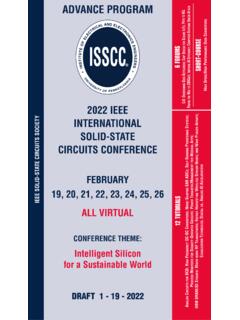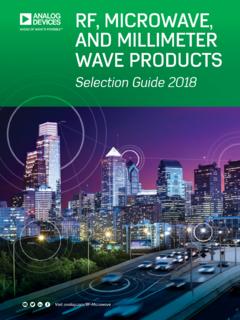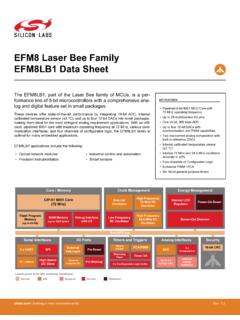Transcription of ADVANCE PROGRAM TTACK ONVERTERS
1 ADVANCE PROGRAMIEEE SOLID-STATE CIRCUITS SOCIETY2022 IEEE INTERNATIONAL SOLID-STATE CIRCUITS CONFERENCE FEBRUARY 19, 20, 21, 22, 23, 24, 25, 26 ALL VIRTUAL CONFERENCE THEME: Intelligent Silicon for a Sustainable World 5-DAY PROGRAM CIX: OVERCOMING DATA BOTTLENECK; CHIP DESIGN FOR SECURE IOTS; PATH TO 6G; PAVING THE WAY TO 200GB/S; IMPROVE AI EFFICIENCY; COMPUTER SYSTEMS UNDER ATTACK12 TUTORIALSANALOG CIRCUITS FOR BCD; high FREQUENCY DC-DC CONVERTERS; NOISE-SHAPING SAR ADCS; SELF-SENSING PROCESSING SYSTEMS; PROCESS MONITORS FOR SIGNOFF-ORIENTED CIRCUITS; POWER TRANSFER/MANAGEMENT FOR MEDICAL APPS; HBM DRAM/3D STACKED: MIXED-MODE RF TRANSCEIVERS; ENERGY HARVESTING WIRELESS SENSOR NODES; MM-WAVE PHASED-ARRAYS; EQUALIZATION TECHNIQUES; DIGITAL VS. ANALOG AI ACCELERATORS SHORT-COURSE high SPEED/ high PERFORMANCE DATA CONVERTERS6 FORUMSDRAFT 1 - 19 - 20222 Need Additional Information? Go to: VISION STATEMENT The International Solid-State Circuits Conference is the foremost global forum for presentation of advances in solid-state circuits and systems-on-a-chip.
2 The Conference offers a unique opportunity for engineers working at the cutting edge of IC design and application to maintain technical currency, and to network with leading 2022 ON-DEMAND CONTENT / RELEASER ecorded content available until March 31, 2022 CONFERENCE TECHNICAL HIGHLIGHTS This year, ISSCC 2022 will be available only virtually. See next page for Conference schedule ON-DEMAND CONTENTRELEASE DATETUTORIALSFRIDAY, FEBRUARY 11, 5PM PSTFORUMS, SHORT COURSEFRIDAY, FEBRUARY 18, 5PM PSTTECHNICAL PAPERSFRIDAY, FEBRUARY 18, 5PM PSTPLENARY TALKSMONDAY, FEBRUARY 21, 7AM PSTS ession 31: Audio AmplifiersSession 16: Emerging Domain-Specific Digital Circuits and SystemsSession 17: Advanced Wireline Links and TechniquesSession 18: DC-DC ConvertersSession 19: Power Amplifiers and Building BlocksSession 15: ML ProcessorsSession 20: Body and Brain Interfaces9:00 AM Session 9: high -Quality GHz-to-THz Frequency Generation and RadiationSession 8: Advanced RF Building BlocksSession 10: Nyquist and Incremental ADCsSession 11: Compute-in-Memory and SRAMS ession 12: Monolithic System for Robot and Bio ApplicationsSession 13: Digital Techniques for Clocking, Variation Tolerance and Power ManagementSession 14: Gan, high -Voltage and Wireless PowerTutorials7:00 AM T6.
3 Wireless Power Transfer and Management for Medical Applications7:20 AM T5: Fundamentals of Process Monitors for Signoff-Oriented Circuit Design7:40 AM T4: Fundamentals of Self-Sensing Processing Systems8:30 AM SE1: Student Research Preview: Short Presentations with Poster Session7:00 AM SE2: Next Generation Circuit Designer 2022 Workshop8:30 AM7:45 AM : Intelligent Sensing: Enabling the Next Automation Age 6:45 AM FORMAL OPENING OF THE CONFERENCE 8:30 AMSession 2: ProcessorsSession 3: Analog Techniques & Sensor InterfacesSession 4: mm-Wave and Sub-THz ICs for Communication and Sensing Session 5: Imagers, Range Sensors and Displays Session 6: Ultra- high -Speed Wireline 8:30 AM8:30 AMSession 22: Cryo-Circuits and Ultra-Low-Power Intelligent IoTSession 23: Frequency Synthesizers7:00 AMSession 27: mm-Wave & Sub-6 GHz and Receivers and Transceivers for 5G Radios Session 28: DRAM and Interface Session 29: ML Chips for Emerging Applications7:00 AM7:00 AMShort Course: high Speed/ high Performance Data Converters: Metrics, Architectures, and Emerging TopicsF3: The Path to 6G: Architectures, Circuits, Technologies for Sub-THz Communications, Sensing and ImagingF4: Paving the Way to 200Gb/s TransceiversF5: How to Improve AI Efficiency Further: New Devices, Architectures and AlgorithmsF6: Computer Systems Under Attack Paying the Performance Price for ProtectionSession 32: Ultrasound and Beamforming ApplicationsHighlighted Industry Chips & Demonstration Sessions7:00 AM : Catalysts of the Impossible: Silicon, Software, and Smarts for the Era of SysMooreSession 7: NAND Flash Memory Session 25: Noise-Shaping ADCs Session 33: Domain Specific Processors7:00 AM SE4: The Bright and Dark Side of Artificial Intelligence (AI) ISSCC 2022 MONDAY FEBRUARY 21ST8:00 AM T3: Noise-Shaping SAR ADCs8:20 AM T2: Fundamentals of high Frequency DC-DC Converters8:40 AM T1.
4 Analog Circuit Design in Bipolar- cmos -DMOS (BCD) Technologies 7:00 AM T12: Advances in Digital vs. Analog AI Accelerators7:20 AM T11: Basics of Equalization Techniques: Channels, Equalization, and Circuits7:40 AM T10: Fundamentals of mm-Wave Phased-Arrays8:00 AM T9: Design Methodologies for Energy Harvesting Wireless Sensor Nodes8:20 AM T8: Fundamentals of Mixed-mode RF Transceivers8:40 AM T7: HBM DRAM and 3D Stacked Memory ISSCC 2022 SUNDAY FEBRUARY 20 THISSCC 2022 TUESDAY FEBRUARY 22 NDSpecial EventsPlenary IPaper Sessions7:45 AM : The Future of the high -Performance Semiconductor Industry and Design7:00 AM : The Art of Scaling: Distributed and Connected to Sustain the Golden Age of Computation8:30 AM ISSCC, SSCS, IEEE Award Presentations Paper SessionsPlenary IIAwardsISSCC 2022 WEDNESDAY FEBRUARY 23RD7:00 AM Demonstration Session 17:00 AM Session 21: Highlighted Chip Releases: Digital/ML7:45 AM Demonstration Session 27:45 AM Session 26: Highlighted Chip Releases.
5 Systems and Quantum ComputingPaper SessionsISSCC 2022 THURSDAY FEBRUARY 24 THSession 24: Low-Power and UWB Radios for Communication and RangingPaper SessionsSpecial Events7:00 AM SE3: Semiconductor Supply Chain Session 30: Power Management TechniquesSession 34: Hardware Security8:30 AM7:00 AMF1: Compute-in-X (CiX): Overcoming the Data Bottleneck in AI Processing F2: Chip Design for Low-Power, Robust, and Secure IoT Devices 8:30 AM8:30 AM SE6: Next Trillion Dollar MarketSpecial Events8:30 AM SE5: Shifting Tides of Innovation Where is Cutting-Edge Research Happening Today?ISSCC 2022 SATURDAY FEBRUARY 26 THForums & Short CoursePaper SessionsISSCC 2022 Timetable7:00 AM7:45 AMForumsISSCC 2022 FRIDAY FEBRUARY 25TH7:00 AM SRP and WiC Mentoring Sessions SRP and WiC Mentoring SessionsTABLE OF SPECIAL EVENTS SE1 Student Research Preview: Short Presentations with Poster SE2 Next Generation Circuit Designer 2022 PAPER SESSIONS 1 Plenary 2 3 Analog Techniques & Sensor 4 mm-Wave and Sub-THz ICs for Communication and Sensing.
6 15 5 Imagers, Range Sensors and 6 Ultra- high -Speed Wireline ..17 7 NAND Flash 1 Plenary II ..19 8 Advanced RF Building 9 high -Quality GHz-to-THz Frequency Generation and Radiation ..21 10 Nyquist and Incremental ADCs ..22 11 Compute-in-Memory and SRAM ..23 12 Monolithic System for Robot and Bio Applications ..24 13 Digital Techniques for Clocking, Variation Tolerance and Power 14 GaN, high -Voltage and Wireless Power ..26 INVITED PAPERS 21 Highlighted Chip Releases: Digital/ML ..27 Demonstration Session INVITED PAPERS 26 Highlighted Chip Releases: Systems and Quantum Computing ..29 Demonstration Session PAPER SESSIONS 15 ML 16 Emerging Domain-Specific Digital Circuits and Systems ..32 17 Advanced Wireline Links and Techniques ..33 18 DC-DC 19 Power Amplifiers and Building Blocks ..35 20 Body and Brain Interfaces.
7 36 22 Cryo-Circuits and Ultra-Low-Power Intelligent 23 Frequency Synthesizers ..38 24 Low-Power and UWB Radios for Communication and 25 Noise-Shaping SPECIAL EVENTS SE3 Semiconductor Supply SE4 The Bright and Dark Side of Artificial Intelligence (AI)..41 PAPER SESSIONS 27 mm-Wave & Sub-6 GHz Receivers and Transceivers for 5G Radios ..42 28 DRAM and 29 ML Chips for Emerging 30 Power Management Techniques ..45 31 Audio Amplifiers ..46 32 Ultrasound and Beamforming 33 Domain-Specific 34 Hardware FORUMS F1 Compute-in-X (CiX): Overcoming the Data Bottleneck in AI Processing ..50 F2 Chip Design for Low-Power, Robust, and Secure IoT Devices ..51 F3 The Path to 6G: Architectures, Circuits, Technologies for ..52 Sub-THz Communications, Sensing, and Imaging SPECIAL EVENTS SE5 Shifting Tides of Innovation Where is Cutting-Edge Research Happening Today?
8 53 SE6 Next Trillion-Dollar Market ..53 FORUMS F4 Paving the Way to 200Gb/s Transceivers ..54 F5 How to Improve AI Efficiency Further: ..55 New Devices, Architectures and Algorithms F6 Computer Systems Under Attack ..56 Paying the Performance Price for Protection SHORT COURSE SC high Speed/ high Performance Data Converters: ..57-59 Metrics, Architectures, and Emerging Topics Conference are a total of 12 tutorials this year on 12 different topics. Each tutorial, selected through a competitive process within each subcommittee of the ISSCC, presents the basic concepts and working principles of a single topic. These tutorials are intended for non-experts, graduate students and practicing engineers who wish to explore and understand a new topic. Naveen Verma ISSCC Tutorials Chair The presentations and the videos of all 12 tutorials (90 minutes each) will be available online, on-demand, as of: Friday, Feb.
9 11, 2022, 5:00pm, PST Live Q&A sessions for the tutorials will be available on: Sunday Feb. 20, 2022, 7:00am - 9:00am PST 20 minute live session = 5 minute summary + 10 minute Q&A + 5 minute break The Q&A sessions will be recorded and made available after their live sessions. Live Q&A - February 20, 7:00am PST T6: Wireless Power Transfer and Management for Medical Applications Mehdi Kiani, The Pennsylvania State University, University Park, PA Wireless technologies play an important role in advanced biomedical systems. Implantable medical devices (IMDs) are a rapidly growing category of bio-systems, where the use of wireless technology is a necessity. This tutorial will present several system- and circuit-level techniques towards the development of novel wireless power-transfer systems with different modalities. Also, novel integrated power-management circuits with voltage and current mode operation will be reviewed. Mehdi Kiani received his and degrees in Electrical and Computer Engineering from the Georgia Institute of Technology in 2012 and 2013, respectively.
10 He joined the faculty of the School of Electrical Engineering and Computer Science at the Pennsylvania State University in August 2014 where he is currently an Associate Professor. His research interests are in the multidisciplinary areas of analog, mixed-signal, and power-management integrated circuits, wireless implantable medical devices, neural interfaces, and assistive technologies. He was a recipient of the 2020 NSF CAREER Award. He is currently an Associate Editor of the IEEE Transactions on Biomedical Circuits and Systems and IEEE Transactions on Biomedical Engineering. Live Q&A - February 20, 7:20am PST T5: Fundamentals of Process Monitors for Signoff-Oriented Circuit Design Eric Jia-Wei Fang, Mediatek, Hsinchu City, Taiwan In advanced technology nodes, the process technology requires more than a year to reach maturity. To avoid costly iterations between design and foundry, thus impeding time-to-market, the final validation of circuit timing and power, known as chip signoff, should leverage on-chip process monitors to speed-up process learning.








